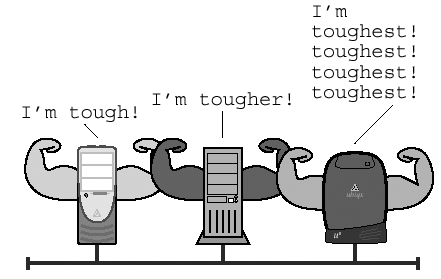20.5 Elections
20.5 ElectionsBrowser elections are fun to watch. They have more in common with the noise and chaos of a party convention than with an actual election. The process is something of a shouting match, and the winner is the last one left shouting at the end. Starting an election is a lot like picking a fight. Some punk computer somewhere on the LAN sends out a challenge, called a RequestElection Browser Frame . The message lets all of the Potential Browsers on the LAN know how tough the sender thinks it is (see Figure 20.4). The Potential Browsers respond by broadcasting their own RequestElection messages, also declaring how tough they think they are. The Potential Browsers don't really want to fight about it, though, so when they hear a RequestElection message from a node that is tougher than they are, they shut up. The specifics of the election criteria will be covered when the we study the browser frames in detail. Figure 20.4. Browser electionsThe Potential Browsers announce their strengths by sending a RequestElection message. The strongest candidate must repeat its announcement several times (typically four) to ensure that all challengers have acquiesced. Just to complete the fighting analogy, each transmission of a RequestElection message during a browser election is called a "round." There are typically four rounds because the eventual winner of the election will repeat its RequestElection message four times to ensure that all of its challengers have given up. Once the winner is confident in its victory it sends a LocalMasterAnnouncement Browser Frame , which has two purposes. First, it lets all of the Backup Browsers know where to find the LMB. Second, the LocalMasterAnnouncement message announces the end of the election. Any further RequestElection messages heard on the wire will signal a new Browser Election. Elections can be forced by sending an empty RequestElection Browser Frame that is, one that announces the sender as being a complete wimp. All of the Potential Browsers on the LAN will have better credentials, so they will try to respond. Elections may be called when a Consumer can no longer find the LMB, or when a new node joins the workgroup and thinks that it has what it takes to be the LMB. When a Domain Master Browser starts up, for instance, it will always call for elections (since it must take over the role of LMB). The RequestElection message is another NBT broadcast datagram. It is meant to be sent to the workgroup <1E> name but it turns out that many clients will accept this message if it is sent to the MSBROWSE<01> name as well, so you can actually cause all of the workgroups on a single subnet to hold elections at the same time. |
EAN: 2147483647
Pages: 210
